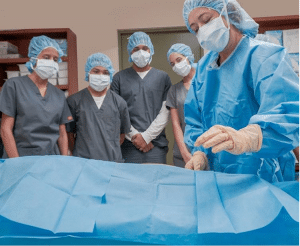Nursing (A.A.S. and B.S.N.)
The Nursing Program has as its mission the formation of nurses able to offer competent, sensible, effective, safe,and quality nursing care to the client person, family and community. The Program aims to produce graduates prepared
to:
1. Provide care with autonomy and with interdisciplinary collaboration and sensitivity to ethical-legal and cultural values and directed to the achievement of the best results for the client .
2. Coordinate care by applying leadership and management skills that lead to the highest quality care with the minimum cost .
3. Assume a commitment as a member of the discipline in harmony with the standards of the practice
.
For the development of this professional diverse and flexible modalities of study are offered. This facilitates mobility from the level of the associate degree to the baccalaureate .
Profile of the Competencies of Graduates
This Associate of Applied Science degree in Nursing is designed to develop the competencies that will permit students to:
Knowledge
1. Demonstrate scientific and humanistic knowledge of the nursing discipline when analyzing biopsycosocial and spiritual aspects in the different stages of growth and development .
2. Know the nursing process as an instrument for making clinical decisions while offering a safe and quality care .
Skills
1. Demonstrate up-to-date clinical skills in therapeutic interventions when you offer care to the client throughout the continuum of health-disease in structured scenarios .
2. Demonstrate care management, coordination skills and effective collaboration as a member of the interdisciplinary team .
3. Use communication skills, critical thinking and the use of technology to maintain the quality of care offered to the client .
Attitudes
1. Demonstrate responsibility and ethical-legal commitment with humanistic care in response to the changing needs of society.
2. Demonstrate responsibility and commitment with their own development and that of the profession.
The Bachelor’s of Science in Nursing is designed to develop the competencies that will permit students to:
Knowledge
1. Demonstrate theoretical and practical knowledge integrated into the safe and effective nursing care provided to individuals, families and communities .
2. Know the use of nursing interventions to prevent disease, and to promote, protect, maintain and restore health .
3. Know critical thinking skills to make clinical judgments and to use research findings for the continuous improvement of the nursing practice .
Skills
1. Use assessment and therapeutic interventions skills when providing nursing care in diverse scenarios so they can improve the expected health care results .
2. Apply skills of communication, collaboration, critical thought, and the use of technology as a provider and coordinator of care and as a future member of the profession .
3. Act as leaders and managers of the care that you are seeking to provide .
Attitudes
1. Apply humanistic care in the nursing practice to promote protection, optimization and the preservation of human dignity.
Major requirements are offered in a four-year program with an option to leave the Program upon completing the requirements of the first two years. Each year is equivalent to a level in which courses have been organized and developed according to their level of complexity. In the first two years (levels I and II) technical (associate) knowledge and skills are presented; in the last two years (levels III and IV) those corresponding to the professional level (generalist) are presented. This scheme articulates both levels of preparation, (associate degree and Bachelor’s Degree in nursing) by integrating knowledge and skills.
Students in the Nursing Program are exempt from taking GEHP 3000 – Well-being and Quality of Life.

